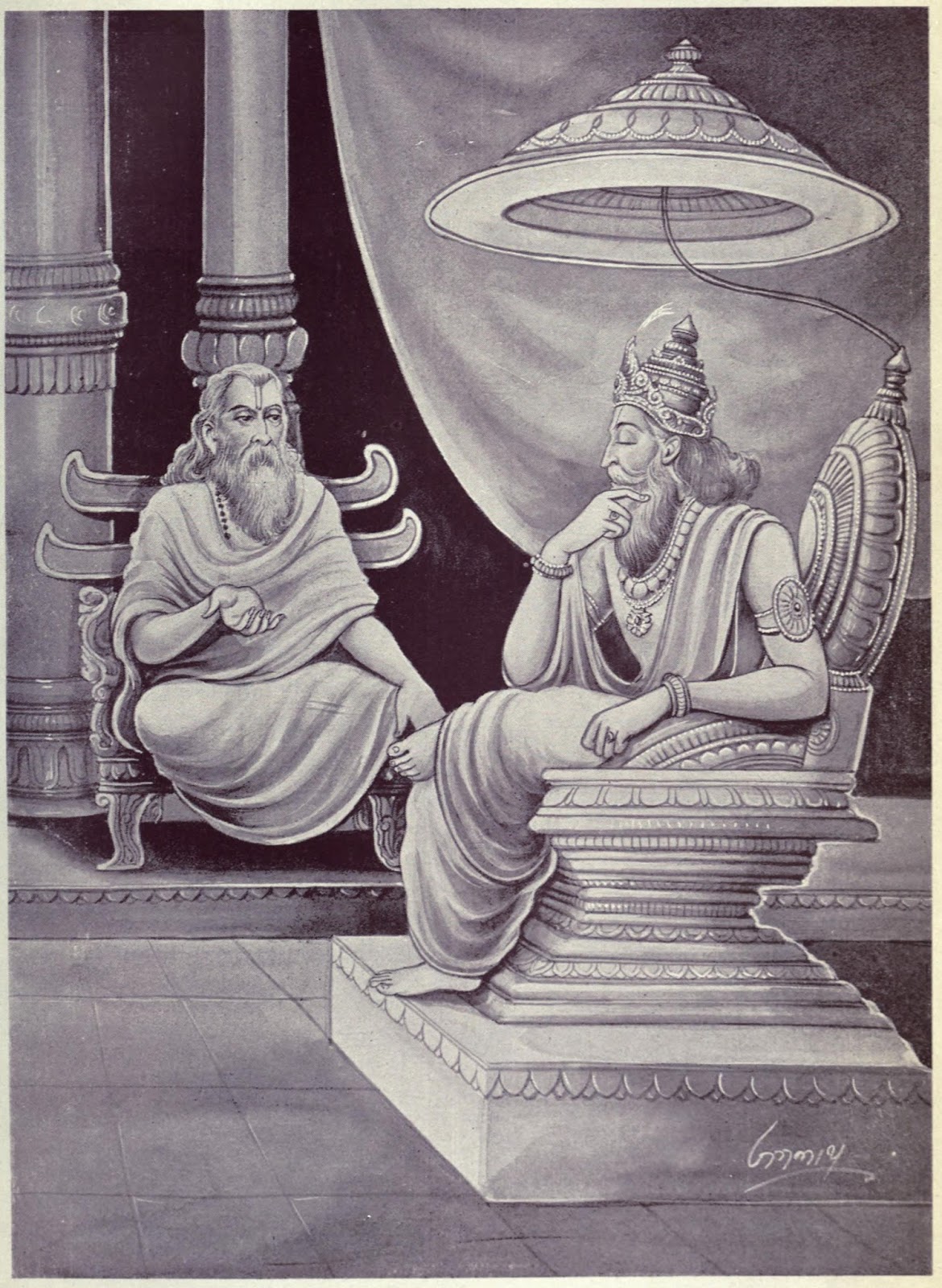Vidura - An underrated sage
When we think of the important characters in the Mahabharata, few names come to mind instantly - the Pandavas (Yudhishtra, Bhima, Arjuna, Nakula & Sahadeva), the Kauravas (led by Duryodhana, Dushasana etc.), Bhishma, Krishna, Draupadi. We even get reminded of Shakuni, Drishtyadhumna, Dhritarashtra, and Gandhari. But we tend to overlook, or not give too much weight to a central character in the epic - Vidura. This post is an attempt to look at Vidura’s part in the complex sociopolitical landscape of the epic and more importantly, the nature of his relationship with the eldest of the Pandavas, Yudhishtra.
First, a brief introduction to Vidura. He was born to Vyasa and the common maidservant of Ambika and Ambalika, called Parishrama. This made him a half-brother to the kings of the Kuru clan - Dhritarashtra, and Pandu. Vidura played the role of one of the principal advisors of the Kuru kingdom and time and again has stood out as one with a deep sense of duty, and adherence to Dharma, something few characters in the epic can stake claim to.

Vidura played a key role in the survival of Pandavas and was in many ways their champion. Right from their childhood, the Kauravas tried to eliminate their cousins through deceitful means, and we see Vidura always step in to protect them. Some notable instances are Vidura’s veiled warnings to Pandavas during their exile in Varanavata, and his assistance in helping them escape through a tunnel dug by his servants beneath the house they lived in, while it was burnt. He becomes a lot more vocal in his support after the marriage of Draupadi with the Pandavas as their military might was enhanced due to their alliances with the Panchalas and Yadavas. He pleads for a truce between them and helps the Pandavas gain their share of the kingdom and establish Indraprastha. During their 13 year exile, he constantly sends messengers to update them on the events and dangers they can expect, ensuring their survival. Also during this period, Kunti stays with Vidura, and not in the palace.
While his affection for Pandavas is plain for all to see, his relationship with Yudhishtra was even more special. He has long conversations with him on multiple occasions after the court proceedings, communicates strategies and warnings only with him and even tries convincing Yudhishtra to not renounce his kingdom after the war was over, and requests him to rule Hastinapur.
This brings us to an interesting question - Why did Vidura take the Pandavas' side and what was his intent in establishing them as the rightful successors to the throne?
First, there’s the question of Dharma. By the rules of the time, Yudhishtra, being the eldest son of Pandu and being older than Duryodhana was the rightful claimant to the throne. That in itself can be reason enough for Vidura to take their side, as he always stood for justice.
But, if we delve deeper, we find a lot more reasons. Vidura himself could have been king, except he was born to a maid-servant and not to a queen, thus losing his right to the throne, in spite of being the only able-bodied brother amongst the three. Could it be that he was sympathetic to the cause of the Pandavas because he didn’t want them to be at the mercy of their cousins like he had to be all his life?
What, then, about his special relationship with Yudhishtra? As we all know, Yudhishtra is also known as Dharma Putra or the son of Dharma. Kunti claims that her three sons were obtained through boons from three gods - Yudhishtra the son of Yama, the god of Dharma and death, Bhima the son of Vayu, god of the Wind, and Arjuna the son of Indra, god of Gods.
While the kids themselves believe this to be true, it is quite clear that it was meant to keep the identities of their original fathers a secret, since it was known that Pandu couldn’t father a child. He himself lived far away in the Himalayas and never came back to Hastinapur. We have already seen the concept of Niyoga being practiced earlier when Vyasa was asked to father the children of Vichitravariya when he died, to ensure the survival of the Kuru race.
We can start to unravel the missing pieces of the puzzle. Both Yudhistra and Vidura are considered symbols of Dharma. They are both wise in their conduct and manner, and always strive for truth and justice. Vidura was Pandu’s younger step-brother, thus being suitable for fathering his wife’s son to ensure his line survived. It can be concluded that Vidura was indeed Yudhishtra’s father.
This isn’t very surprising if we consider the events post the Mahabharatha war. At the time of his death, Vidura is said to have transferred his powers, intelligence and wealth to Yudhishtra, through yogic powers. This was a practice carried out between a father and a son. Furthermore, Vyasa states - “He who is Dharma is Vidura and the Pandava, Yudhishtra is that Vidura”. While that statement isn’t unambiguous, it again hints at their relationship being a lot more than meets the eye.
The above conclusions aren’t my own. I have come across similar conclusions in quite a few books I’ve read on the Mahabharata, and this post is a review and reaffirmation of these conclusions. As always, the Mahabharata continues to surprise me with its infinite layers, and it is my hope that I can inspire the readers of this post to read it as well and share the joy I’ve found within it.
Originally published here.